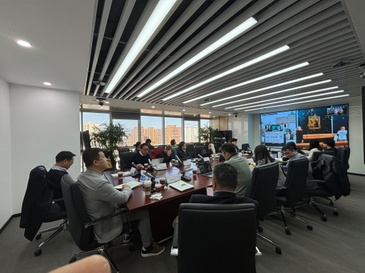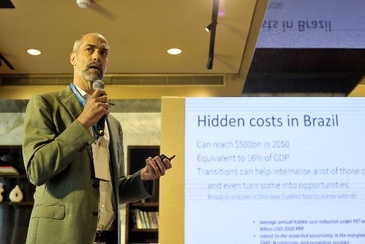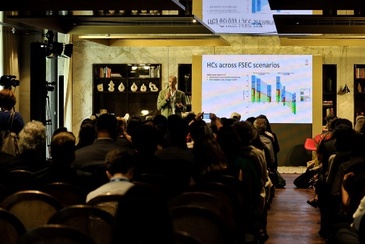
Alex Koeberle, FSEC collaborator, Caterina Ruggeri Laderchi, FSEC Director, and Rachel Nugent, FSEC Commissioner on panel discussion for FSEC.
The Hidden Costs of the Indian Food Systems - Assessment and Policy Solutions was presented in Delhi at the India Food Systems Dialogue 2023 by FSEC and partners from the Food, Agriculture, Biodiversity, Land-Use and Energy (FABLE) Consortium. Caterina Ruggeri Laderchi, FSEC Director, highlighted the potential for immense economic benefits, emphasizing the need for comprehensive transformation to address global climate goals and various socio-economic challenges. Vartika Singh, FSEC collaborator, delved into the hidden costs of India's food system, revealing significant negative externalities often overlooked in economic decision-making. Prantika Das, FSEC collaborator, presented results showing the economic benefits of transforming food systems in India, which could significantly reduce hidden costs over time. Discussion points included clarifications on excluded costs, data gaps, and the need for region-specific information. Concrete suggestions for next steps involve exploring geospatial platforms, addressing data gaps, integrating additional cost analysis, and organizing stakeholder consultations for further refinement of methodologies and policies. The conversation concluded with a consensus on the importance of stakeholder engagement and continuous refinement of analytical approaches to support responsible progress in transforming India's food system.

Experts from academia and policy making spheres, including Shenggen Fan, FSEC Commissioner, and Xiaoxi Wang, FSEC collaborator, gathered at the event held in Beijing.
On February 29, 2024, the Academy of Global Food Economics and Policy (AGFEP) and FSEC hosted the Economics of Food System Transformation webinar in Beijing and launched the FSEC Global Policy Report and Journal Integrative Agriculture (JIA) special issue. The event delved into the hidden costs of the current Chinese agri-food system and explored strategies for transformation, emphasizing the need to balance trade-offs and synergies between food production, climate change, affordability, and nutrition. FSEC Commissioners, Shenggen Fan and Hermann Lotze-Campen, and FSEC collaborator, Xiaoxi Wang, presented and contributed to various parts of the agenda, including presentations, panel discussions, and a roundtable session involving experts from academia and policy making spheres. The event culminated in a forward-looking discussion on advancing the goals of food system transformation.


Alex Koeberle, FSEC collaborator presents analysis on the hidden costs of Brazil.
As part of the Climate Finance Forum in São Paulo on 26-27 February, FSEC hosted the event The Economics of the Food System Transformation: Priorities for Brazil. The Forum, first announced at COP28 alongside Brazilian Minister of Finance Fernando Haddad, precedes the G20 Finance Ministers meeting and brought together members of the private sector, business coalitions, civil society, philanthropy, multilateral financing and economic organizations, both national and international, that are driving a green and just transition to a global low-carbon economy. Through presentations and a panel, Alex Koeberle, FSEC collaborator, Caterina Ruggeri Laderchi, FSEC Director, and Rachel Nugent, FSEC Commissioner, outlined critical recommendations for policies to transform food systems and strategies to overcome political economy barriers to change, drawing on the recently published Global Policy Report and commissioned national analysis. The focus was particularly on the hidden costs of the food system in Brazil and priorities for how these can be reduced. FSEC’s modelling work provided crucial insights to this audience into how a sustainable transition of the Brazilian livestock sector can be achieved and financed.





